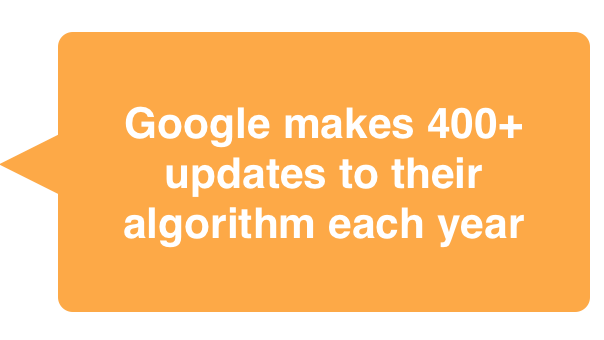Preparing for the Future of Google Updates
It seems as though whenever there is a major update from Google we have a rise of SEOs in the industry discussing the casualties of impacted websites. Wouldn’t it be nice if there were a way to predict when an update would occur and what that update affected? There is no crystal ball to predict the future of updates, trust me, I looked, however I believe that you can prepare for them.
The SEO community understands that Google attacks spammy tactics by constantly updated their algorithm. Despite that understanding many SEOs are still surprised when updates occur.
Just like preparing for a natural disaster, there are things that you can do to prepare yourself for future Google algorithm updates. Preparing for a Google update can be difficult as there are many aspects and different types of updates. Just like you can’t fully predict when a natural disaster will begin, you can’t predict when a Google update will occur, but you can prepare for these whirlwind changes.
Before we go any further, I think it is important to understand what we are up against. Understanding what an update is and why it happens can help us better know how to prepare for one.
Understanding the Updates
 Since the beginning, Google took great pride in their search algorithm. I believe that a large part of why Google is so successful is because of their algorithm.
Since the beginning, Google took great pride in their search algorithm. I believe that a large part of why Google is so successful is because of their algorithm.
Google’s algorithm has arguably proven to bring up the most relevant results of any search engine. This is why so many searchers choose Google over any of the other search engines.
Having better results in the SERPs (Search Engine Results Page) means more people will visit the search engine. More people visiting the search engine means more people clicking on ads, more people clicking on ads means more $$$ for Google. Showing the best results is in Google’s best interest.
Google makes 400+ updates to their algorithm each year. That is an average of over one update each day.
Most of these updates are small and affect very little of the overall search results. About every 3-4 months Google will make a ‘major’ algorithmic change resulting in a larger impact of the overall search results. The most recent and largely known updates are updated versions of Panda and Penguin.
Google will continue to make algorithm changes to show that their Search Engine is always the best and is getting better in the quality of results that are displayed.
Preparing with the Two Basics
 Now that we have a better understanding of what Google updates are and why they exist, let’s discuss what every website needs to prepare for one.
Now that we have a better understanding of what Google updates are and why they exist, let’s discuss what every website needs to prepare for one.
Google says there are over 200 factors to their secret algorithm. Although this is the case, SEO is really just 2 basic things. Onsite and Offsite.
Onsite:
When we talk about onsite, we are talking all about your website. Your website is your digital representation to the online world. Google looks at your website as the #1 resource for information about your business. Since this is the case, I think your website is the first thing you look at when preparing for a Google update.
When preparing ahead for an algorithm update, focusing on your onsite factors is easy. Onsite is all about one thing: user experience.
In general, Google doesn’t want to list a website that will lead to a searcher having a bad experience on your website. With each update, Google better understands a user’s experience on your website.
7 years ago, SEO was all about stuffing keywords in the body of your text to get a website to rank well. Today, keyword stuffing is considered a BlackHat SEO tactic. Although your ranking would be great, this would often lead to a bad user experience as many websites were ranking that weren’t truly relevant to the search rearm. Thanks to Google’s updates, this type of manipulation is near impossible today.
Google’s updates are all about helping the user have the best experience with search results. When it comes to onsite, think about the experience of your visitors and less about the keyword you are targeting. Here are some of the more common onsite factors in ranking that aren’t going away for a while.
Site Speed:
Increasing your sites load speed is an increasingly important factor of SEO. Google has noticed that users don’t want to wait long for information.
Mobile:
We live in the age of mobile. Chances are that many of your visitors are using mobile devices when they go to your website. Having a mobile friendly version of your website will help lead to a better customer experience.
Content:
Content is still king. Your content must be unique and relevant. Don’t copy content and put it on your website. Update your content regularly to make sure it is fresh and includes the most up to date information.
Site Structure:
Having a website that users can easily navigate through is important. Make sure that all of your internal links go to active pages and work to get all inactive pages 301 redirected to relevant active pages.
On Page SEO:
Besides your content it is important to make sure each page is optimized with relevant phrases in the title tag, meta description, appropriate image tags and headings. CAUTION: this can be an area where the spam monster will creep in. Don’t give in to spam and make sure that each of these areas are optimized for user experience.
Blogging:
If applicable, start a blog on your website and regularly post to it. When it comes to onsite blogging many business make the mistake of spamming their users with self-promoted posts. Resist the urge and post sharable content that is relevant to your industry.
Social Outreach:
Reach out to your community via social channels that are linked to your website.
Again, remember, with each of these tactics the idea is to help your visitors, NOT to spam them. When writing content for your website think less about the ‘keywords’ you want to optimize and more about the value you want to provide visitors. Use words that they would use and ensure that your content flows and doesn’t include the main keywords just for the sake of including them.
Offsite:
Offsite is essentially anytime your business or website is mentioned on the internet in any place other than your website. These are mostly identified as links pointing to your website from other websites.
Offsite is where many SEOs get lost and quite frankly where Google attacks spam the most. 7 years ago link building was the only thing you needed to do to get a website ranked. There were companies that could build you 1000 links for under $100. Due to the many updates Google has made, we now have a very different idea of offsite. Offsite work and links are still a huge factor in SEO, but it has changed significantly over the years. It is now less about the quantity of links and more about the quality. Here are some tips on offsite SEO factors that will help you prepare ahead for algorithm updates.
Don’t Spam:
Offsite spam could be seen as a high number of links from low quality websites, links coming from the same website, high volume of similar link types, paid links, etc. In general you can guess that you are spamming when your site is getting a unusual volume of links to your website.
Reach Out in the Online Community:
Look for blogs that are talking about your service or product and make comments on those blogs (not in a spammy way, but relevant).
Article or Blogging:
Find ways that you can reach out through other websites by posting articles or blogs. If done wrong, this can be seen as a spammy tactic. The purpose is to provide value to the web by providing relevant and valuable pieces of content across the web through relevant channels.
Local Citations:
Submit your business to listing websites that are popular, relevant to your location or relevant to your industry. Ensure that your name, address and phone number are the same on each of the listings offering more authority to your business.
Link Analysis:
Constantly review links pointing to your website and remove the lower quality or spammy links. Take extreme caution when doing this, you don’t want to remove links that are valuable to your authority. In general, remove links that are from websites that are not relevant to your industry or business or are from shady looking websites.
Review
Predicting a Google Algorithm can be near impossible, but preparing for one doesn’t have to be. Remember that the key concept to preparing is constant change. keep your ear to the ground in the SEO community and continually provide changes to your website. Doing this will ensure you are in the most prepared state for algorithm updates
